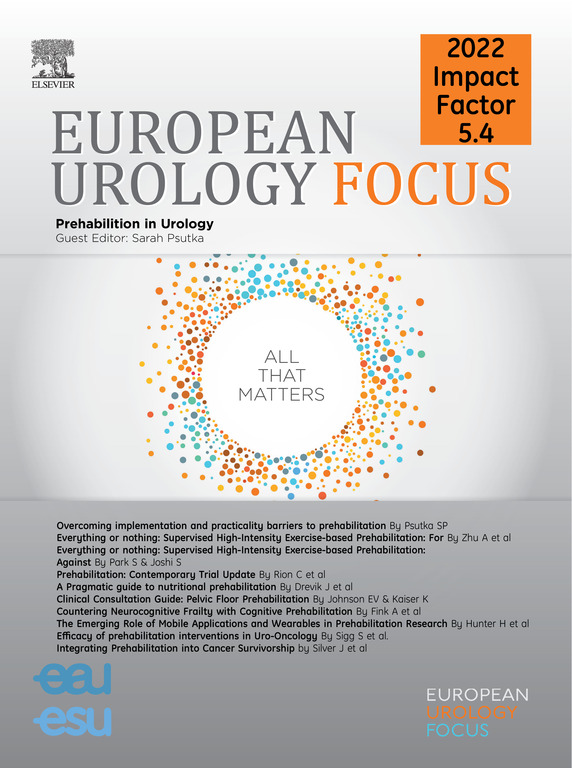癌症局部前列腺癌患者对人工智能决策的信任:前瞻性试验结果。
IF 4.8
2区 医学
Q1 UROLOGY & NEPHROLOGY
引用次数: 0
摘要
背景:人工智能(AI)具有提高诊断准确性和改善治疗结果的潜力。然而,人工智能与临床工作流程和患者视角的整合仍不明确。目的:确定患者对人工智能的信任,以及他们对泌尿科医生依赖人工智能的看法,以及人工智能在患者诊断和治疗方面的未来应用。设计、设置和参与者:一项前瞻性试验涉及接受癌症(PC)诊断或治疗干预的患者。干预:要求患者在磁共振成像、前列腺活检或彻底前列腺切除术前完成一项调查。结果测量和统计分析:主要结果是患者对人工智能的信任。次要结果是治疗环境中人工智能的选择以及人工智能和泌尿科医生的特征。结果和局限性:对466名患者的数据进行了分析。对技术的累积亲和力与对人工智能的信任呈正相关(相关系数0.094;p=0.04),而患者年龄、教育水平、,医生对能力的信任度平均得分(±标准差)高于AI在传达诊断时以个性化方式做出反应的平均得分(4.51±0.76 vs 3.38±1.07;平均差[MD]1.30,95%置信区间[CI]1.010-1.250;t924=18.52,p921=27.27,p925=42.89,p结论:对未来基于人工智能的诊断和治疗的信任依赖于与泌尿科医生的最佳集成,作为利用人类和人工智能能力的人机界面。患者总结:人工智能(AI)将在未来癌症的诊断决策中发挥作用。目前,患者更喜欢人工智能辅助的泌尿科医生,而不是单独的泌尿科、单独的人工智能和人工智能控制的泌尿科。人工智能和泌尿科医生的特殊特征可用于优化癌症前列腺患者的诊断和治疗。本文章由计算机程序翻译,如有差异,请以英文原文为准。
Patients’ Trust in Artificial Intelligence–based Decision-making for Localized Prostate Cancer: Results from a Prospective Trial
Background
Artificial intelligence (AI) has the potential to enhance diagnostic accuracy and improve treatment outcomes. However, AI integration into clinical workflows and patient perspectives remain unclear.
Objective
To determine patients’ trust in AI and their perception of urologists relying on AI, and future diagnostic and therapeutic AI applications for patients.
Design, setting, and participants
A prospective trial was conducted involving patients who received diagnostic or therapeutic interventions for prostate cancer (PC).
Intervention
Patients were asked to complete a survey before magnetic resonance imaging, prostate biopsy, or radical prostatectomy.
Outcome measurements and statistical analysis
The primary outcome was patient trust in AI. Secondary outcomes were the choice of AI in treatment settings and traits attributed to AI and urologists.
Results and limitations
Data for 466 patients were analyzed. The cumulative affinity for technology was positively correlated with trust in AI (correlation coefficient 0.094; p = 0.04), whereas patient age, level of education, and subjective perception of illness were not (p > 0.05). The mean score (± standard deviation) for trust in capability was higher for physicians than for AI for responding in an individualized way when communicating a diagnosis (4.51 ± 0.76 vs 3.38 ± 1.07; mean difference [MD] 1.130, 95% confidence interval [CI] 1.010–1.250; t924 = 18.52, p < 0.001; Cohen’s d = 1.040) and for explaining information in an understandable way (4.57 ± vs 3.18 ± 1.09; MD 1.392, 95% CI 1.275–1.509; t921 = 27.27, p < 0.001; Cohen’s d = 1.216). Patients stated that they had higher trust in a diagnosis made by AI controlled by a physician versus AI not controlled by a physician (4.31 ± 0.88 vs 1.75 ± 0.93; MD 2.561, 95% CI 2.444–2.678; t925 = 42.89, p < 0.001; Cohen’s d = 2.818). AI-assisted physicians (66.74%) were preferred over physicians alone (29.61%), physicians controlled by AI (2.36%), and AI alone (0.64%) for treatment in the current clinical scenario.
Conclusions
Trust in future diagnostic and therapeutic AI-based treatment relies on optimal integration with urologists as the human-machine interface to leverage human and AI capabilities.
Patient summary
Artificial intelligence (AI) will play a role in diagnostic decisions in prostate cancer in the future. At present, patients prefer AI-assisted urologists over urologists alone, AI alone, and AI-controlled urologists. Specific traits of AI and urologists could be used to optimize diagnosis and treatment for patients with prostate cancer.
求助全文
通过发布文献求助,成功后即可免费获取论文全文。
去求助
来源期刊

European urology focus
Medicine-Urology
CiteScore
10.40
自引率
3.70%
发文量
274
审稿时长
23 days
期刊介绍:
European Urology Focus is a new sister journal to European Urology and an official publication of the European Association of Urology (EAU).
EU Focus will publish original articles, opinion piece editorials and topical reviews on a wide range of urological issues such as oncology, functional urology, reconstructive urology, laparoscopy, robotic surgery, endourology, female urology, andrology, paediatric urology and sexual medicine. The editorial team welcome basic and translational research articles in the field of urological diseases. Authors may be solicited by the Editor directly. All submitted manuscripts will be peer-reviewed by a panel of experts before being considered for publication.
 求助内容:
求助内容: 应助结果提醒方式:
应助结果提醒方式:


